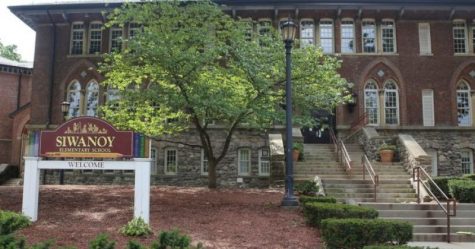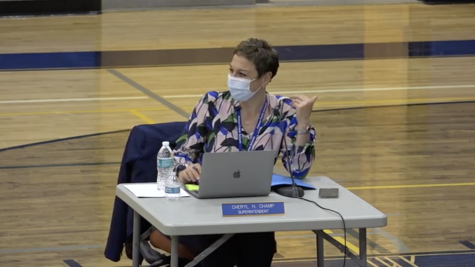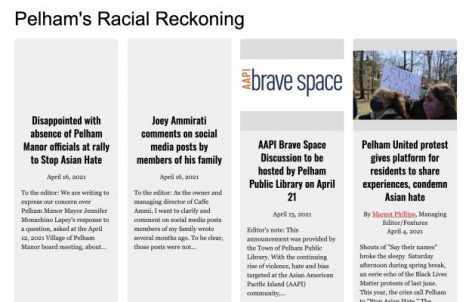Dismay at Examiner’s coverage of ‘The Pelham Laundry’ exhibit; ‘substantive article about the installation’ needed
To the editor:
I am writing to you today to express my dismay at your recent coverage—or lack thereof—of “The Pelham Laundry” exhibit. Your June 23 article on “The Pelham Laundry” focused primarily on the controversy surrounding the initial social media posts that led to its creation, but, sadly, there was no follow-up covering the work itself, its impact on our community and the many intense conversations that took place in the Pelham Art Center courtyard during its exhibition. “The Pelham Laundry” was a very timely response to a national uprising against systemic racism and the police brutality that our culture of racism has allowed to persist. It was covered in-depth by CBS local news, yet hardly covered at all by its hometown news source, this publication. The only follow-up to that initial, brief update is a Village of Pelham Board of Trustees summary of Sept. 22, highlighting the village’s plan to establish a municipal arts council. There are several misleading and incorrect statements regarding “The Pelham Laundry” in this summary, including one that says the Pelham Art Center denied a request to install “The Pelham Laundry” in Wolfs Lane Park. In fact, The Pelham Art Center was incredibly supportive of the work, making curatorial suggestions, taking on legal and financial risks by presenting the exhibit, all during a very difficult time with respect to Covid-19. I wish the Pelham Examiner had reached out to any of us, the creators of “The Pelham Laundry,” or the The Pelham Art Center, to write a substantive article about the installation and the emotional response from the community. We would have been happy to share with you and your readers the process that brought forth this raw and eye-opening exhibit. According to Charlotte Mouquin, the director of the Pelham Art Center, “The emotional responses we had to this from people passing by were incredible. We had people in tears before we finished installing the piece. We had mothers approach us and say, ‘Thank you, I am bringing my children back to see this, so they realize they are not alone.’ We had an outpouring of people in support of the exhibition, parents and community members saying, ‘I didn’t know how to have a conversation about racism with my kids, and this opened my eyes to see what they and their friends are witnessing and experiencing.’”
We, the organizers of “The Pelham Laundry,” approached the Village of Pelham Board of Trustees in June to request permission to install the work for a longer period in Wolfs Lane Park. It is imperative to us that we sustain these conversations. Fighting systemic racism, police profiling and brutality, and achieving academic equity and representation will be a long, arduous process. There will be many, many more art exhibits around the country to help us heal from, understand and transcend the racism built into our culture and civic infrastructure. “The Pelham Laundry” may have played a role in speeding the process of establishing a municipal arts council, but we will wait for the bureaucratic process to unfold, despite our growing impatience, because public art is a necessity, not a luxury, particularly in this time of social awakening.
I, Paula Wood, one of the creators, have been a Pelham resident for nearly 12 years. In those years, I have witnessed acts of both passive and aggressive racism. I have said goodbye to minority neighbors who chose to move to more welcoming communities. I have also enjoyed the increasingly diverse community we live in, through incredible events such as the biennial International Day at Hutchinson School and the many global arts and culture events provided by the Pelham Art Center, for free, to our community, as well as the hard-to-find international and independent films we can see any given week at The Picture House. Standing in the courtyard during “The Pelham Laundry” exhibition, however, was the first time in my years living here that I have had genuine, open and painful conversations with my neighbors about the history of racism in Pelham that many of us white residents were only vaguely aware of.
The village board of trustees is deep into the process of establishing a municipal arts council to attract and exhibit public art in our already aesthetically appealing town. This was on Mayor Chance Mullen’s mind prior to “The Pelham Laundry” exhibition, as he has stated in public meetings. Public art can be a magnet to bring visitors to our community, but it is also a mirror to who we are as a community. Without looking at ourselves holistically, we will never truly be whole. I thank you for the coverage you provided of “The Pelham Laundry” and implore you to deploy your reporters to cover our arts in greater detail, especially when that art is so bound up in our community. If it makes us uncomfortable, then it’s probably worth talking and writing about in detail.
Please submit your experiences of racism to [email protected] and visit the online installation.
Paula Wood, producer of The Pelham Laundry
62 Clifford Ave.
Sabrina Harrison, creator of The Pelham Laundry
Astiney Montiel, facilitator of The Pelham Laundry






Nichole Otondi • Sep 28, 2020 at 6:14 pm
Thank you for bringing to light the important points here. What resonated with me most is that “If it makes us uncomfortable, then it’s probably worth talking and writing about in detail.”
Maryanne Joyce • Sep 25, 2020 at 7:11 pm
Writing to flag for those who may be unaware. The Pelham Examiner is an entirely student-run newspaper. In my experience, they will happily take story suggestions.
From the About Us section of the website:
We are the Pelham Examiner, Inc.: The student-run, student-owned independent newspaper serving the Town of Pelham. Our team is made up of 42 dedicated individuals ranging in age from 10 to 18.
Deborah Lowery Knapp • Sep 25, 2020 at 1:58 pm
This letter brings up an important point about the need for thorough and critical coverage of local issues and events. Very thoughtful analysis I’m sure will be met with redoubled efforts on the part of this publication to meet that need.